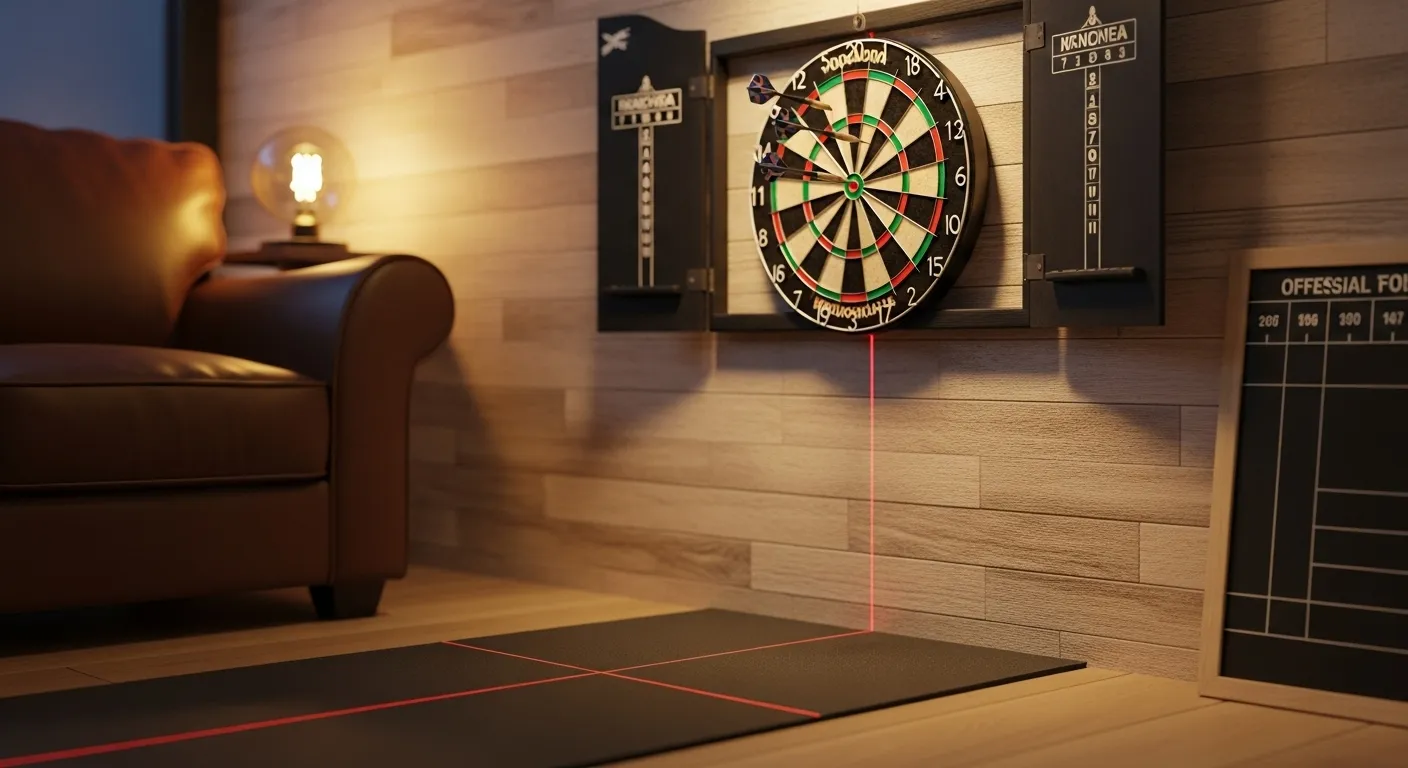Ever watched a dartboard hanging in a pub corner and thought, “There’s no way that’s as simple as it looks”? You’d be right.
Understanding darts rules isn’t rocket science, but it’s not just “throw and hope” either. The game’s got structure, scoring logic, and a surprising amount of etiquette. When you are learning basic darts rules for a home setup or aiming to play in a professional darts tournament, getting the rules down early makes a massive difference.
So let’s strip it all down, how to play darts, how the scoring works, what numbers on the board actually mean, and even why there is a line on the floor you’re not supposed to cross.
The Fundamentals: What Is Darts?
Let’s first get a sense of this game before diving into the rules of dart game. Players in the precision sport of darts toss tiny darts at a circular board that is fixed to a wall. The objective? To score points, beat your opponent to a target score (such as 501 or 301), and hit certain numbered areas. If you want to explore more options and variations, check out our list of top dart games, both classic and modern.
It’s a patience, maths, and muscle memory game. And when the hand trembles, perhaps a little bit of luck.
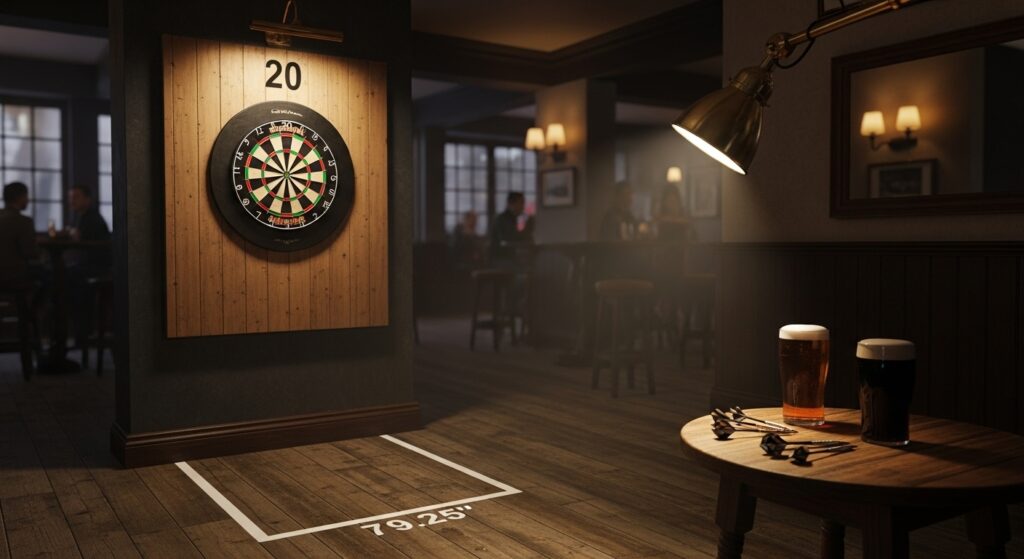
Dartboard Setup Guide (Height, Distance, and Layout)
Getting the setup right matters. You can’t play fair if your board’s hanging too high or your throw line’s too close.
Official Dartboard Setup Regulations
| Element | Measurement | Notes |
| Dartboard Height | 5 feet 8 inches (1.73m) | Measured from the floor to the bullseye center |
| Throw Line Distance (Oche) | 7 feet 9¼ inches (2.37m) | From the front of the dartboard to the back of the throw line |
| Board Diameter | 17¾ inches (45.1cm) | Standard tournament size |
| Bullseye Diameter | 1½ inches | Divided into inner and outer bull |
(This follows both PDC darts rules and World Darts Federation rules for official tournaments.)
DartBoard Segments & Layouts Described
Twenty numbered sections, each worth one to twenty points, make up the dartboard. You possess:
- Single Area – the main fat part of each wedge.
- Double Ring – the thin outer circle (worth double the number).
- Triple Ring – the inner thin ring (worth triple).
- Outer Bull – worth 25 points.
- Inner Bull (Bullseye) – worth 50 points.
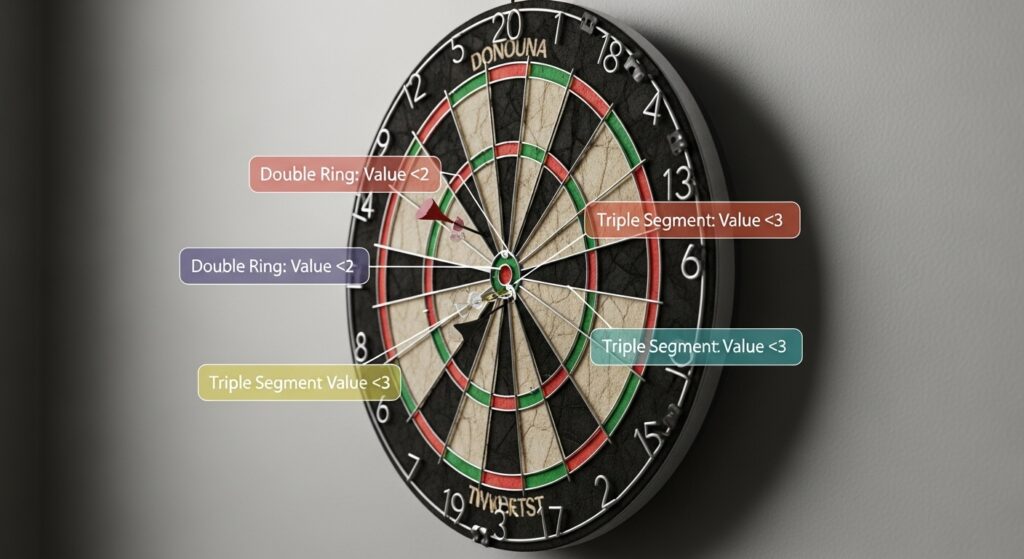
Darts Equipment Rules: What You Need
Although equipment is essential, you do not have to use it to play darts.
- Darts: Are usually made of brass, tungsten or nickel-silver, and most professionals use 20 to 26 grammes, but there is a wide variety of weights available ranging from 12 to 50 grammes.
- Flights: The dart is stabilised during flight by its rear wings.
- Shaft: Connects the flight and barrel.
- Barrel: The grip area where you hold it.
Under professional darts rules, your dart can’t exceed 30.5 cm in total length.
Dart Types and Weight
| Dart Type | Common Use | Weight Range |
| Brass Darts | Beginners | 18–24g |
| Tungsten Darts | Advanced & Pros | 20–26g |
| Nickel Darts | Casual Players | 16–22g |
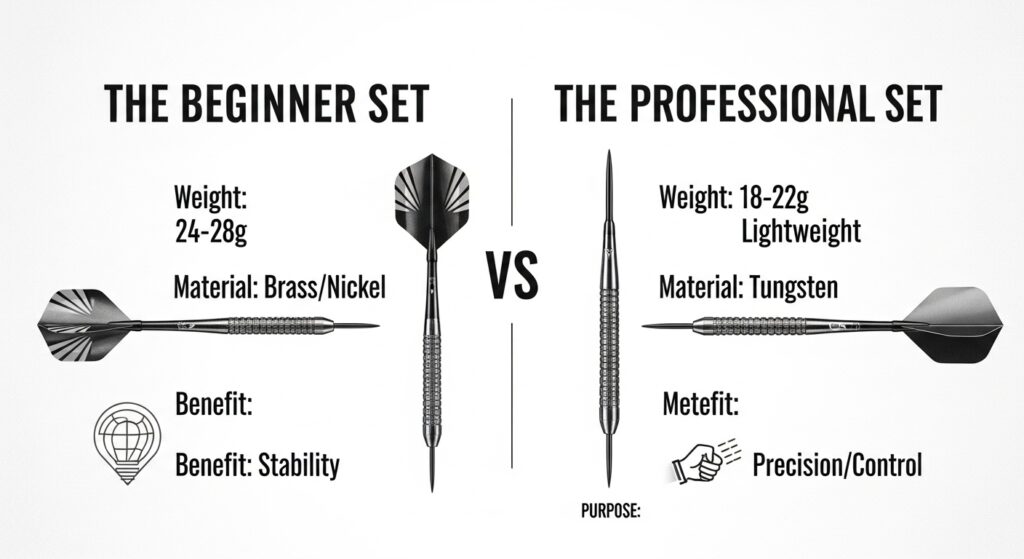
Basic Dart Rules: How to Play Dart (Simplified)
Let’s break down so you can actually start throwing.
According to the 501 or 301 darts rules, that is how a typical dart game proceeds:
- Players start with a fixed score (from 501 or 301).
- Each players throw three darts per turn.
- Points scored are subtracted from your starting total.
- The goal is to reach exactly zero—not less.
- The last dart must hit a double (this is called “double out”).
Example:
Start: 501
You score 100 → remaining = 401
Next turn 140 → remaining = 261
You continue until 0. But if you go below 0, it’s called a bust—and your score reverts to the start of that turn.
This “double out” system is part of the double in double out rules, crucial in pro formats.
Darts Scoring Rules: How to Score in Darts
Darts Scoring Explained
Each dart’s score depends on where it lands.
| Area | Score |
| Single Section | Number shown |
| Double Ring | Number × 2 |
| Triple Ring | Number × 3 |
| Outer Bull | 25 |
| Inner Bull (Bullseye) | 50 |
| Miss | 0 |
So if you’ve hit the triple 20, that is 60 points, the highest single-dart score possible.
Darts Scoring System in Popular Games
501 Darts Rules
- Start from 501.
- Subtract each round’s total.
- Must end on a double.
301 Darts Rules
Same as 501, just shorter. Usually for faster games or beginners.
Cricket Darts Rules
Hit numbers 15–20 and the bull three times each. Close them before your opponent.
(Scoring here’s about control, not subtraction.)
Around the Clock Darts Rules
You aim at numbers sequentially from 1 to 20, then bullseye.
Fun for beginners learning accuracy.
Killer Darts Rules
Each player gets a number. Hit doubles to become a “killer,” then take out others by hitting their numbers.
Baseball Darts Rules
Nine innings, each inning corresponds to a number (1–9).
Points depend on doubles/triples of that inning number.
Count Up Darts Rules
Perfect for practice. Just total as many points as possible within a set number of rounds.
Shanghai Darts Rules
Each round focuses on one number. Score singles, doubles, and triples of that number for a “Shanghai” (auto-win).
Scoring Example Table
| Dart Throws | Hit | Points | Total |
| Dart 1 | Triple 20 | 60 | 60 |
| Dart 2 | Single 20 | 20 | 80 |
| Dart 3 | Double 10 | 20 | 100 |
You’d subtract 100 from your starting total (like 501 → 401).
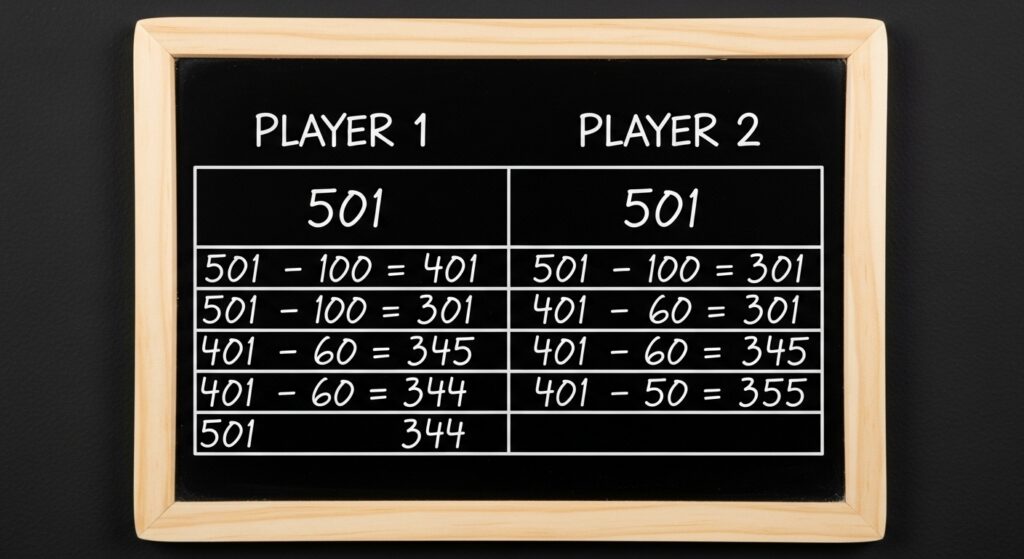
Dart Match Rules & Formats
A match is split into legs and sets.
- A leg = one game (first to reach zero).
- A set = first to win a set number of legs (usually best of five).
Most pro matches are best of 7 or 9 sets.
In tournament darts rules, matches can vary by event.
For example:
- PDC World Championship: Best of sets.
- Premier League Darts: Best of legs.
Dart Competition Format
- Single Elimination: Loose one and you are out.
- Double Elimination: Two losses allowed.
- Round Robin: Everyone plays everyone.
Dart Throwing Rules And Etiquette
There’s no official “stance law,” but dart throwing rules under standard darts rules say:
- You can lean forward, but no foot crosses the oche (throw line).
- Each turn = 3 darts.
- Retrieve darts only after scores are confirmed.
Darts etiquette rules might sound old-school, but they matter:
- Don’t distract the thrower.
- No trash talk mid-throw.
- Always acknowledge good shots (sportsmanship counts).
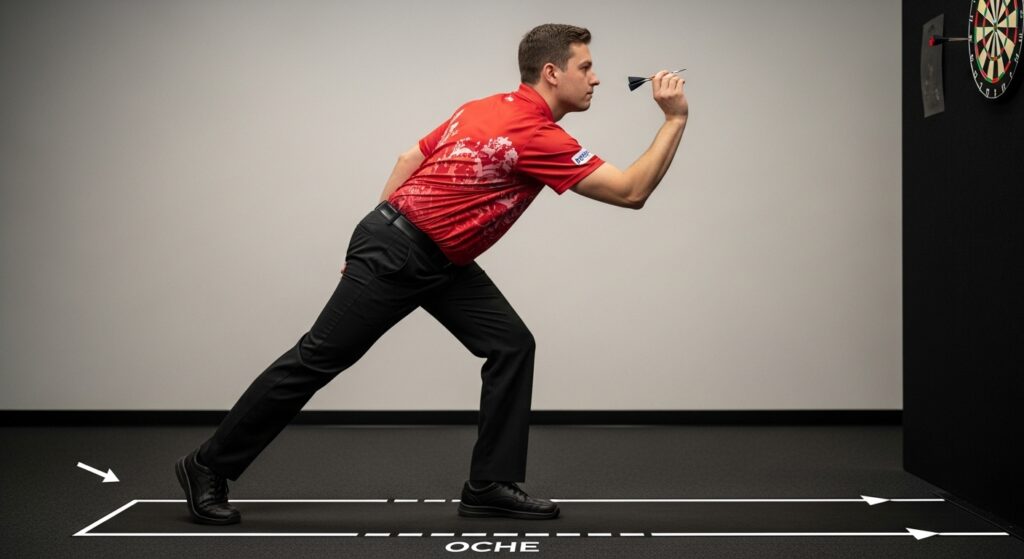
Dartboard Rules for Beginners
If you’re setting up at home, here’s your darts for beginners guide condensed:
- Hang board at correct height (5ft 8in).
- Mark throw line at 7ft 9¼in.
- Start with 301—less pressure.
- Focus on singles before doubles/triples.
- Learn the scoring zones first, not fancy finishes.
And if you’re wondering “how many points in darts?” — well, technically 501’s the max start, but per throw, 180 is the best possible (three triple 20s).
Dart Score Sheet Example
| Round | Player 1 | Player 2 |
| 1 | 100 | 80 |
| 2 | 85 | 95 |
| 3 | 140 | 60 |
| Total | 325 | 235 |
(Keep simple handwritten sheets if you don’t have an app. Old-school but satisfying.)
Scoring Strategies in Darts
The real trick isn’t hitting random high numbers—it’s knowing when to hit what.
Pros use “checkouts” — planned combos to finish a leg efficiently. For example:
- 170 finish: Triple 20, Triple 20, Bullseye.
- 121 finish: Triple 20, 11, Bullseye.
Learn doubles early. The doubles and triples in darts are your bread and butter.
Darts Game Variations (More Than You Think)
Aside from 501 and Cricket, there are dozens of formats—some weird, some fun.
- Knockout Darts Rules: Losers rotate out, winner stays until beaten.
- Double In Double Out Rules: You must start and finish with a double.
- Shanghai and Baseball we covered.
- PDC vs. WDF Rules: Slight variations in scoring confirmation, but format remains consistent.
Each variation helps improve different skills—accuracy, consistency, strategy.
Darts Terminology Cheat Sheet
| Term | Meaning |
| Oche | Throw line distance in darts |
| Leg | A single game from start to zero |
| Set | Collection of legs |
| Bust | Going below zero—round void |
| Checkout | Finishing combination to hit exactly zero |
| Flight | Back fins on dart |
| Barrel | Part you grip |
| Doubles/Triples | Rings with 2× or 3× value |
| Bullseye | 50-point center shot |
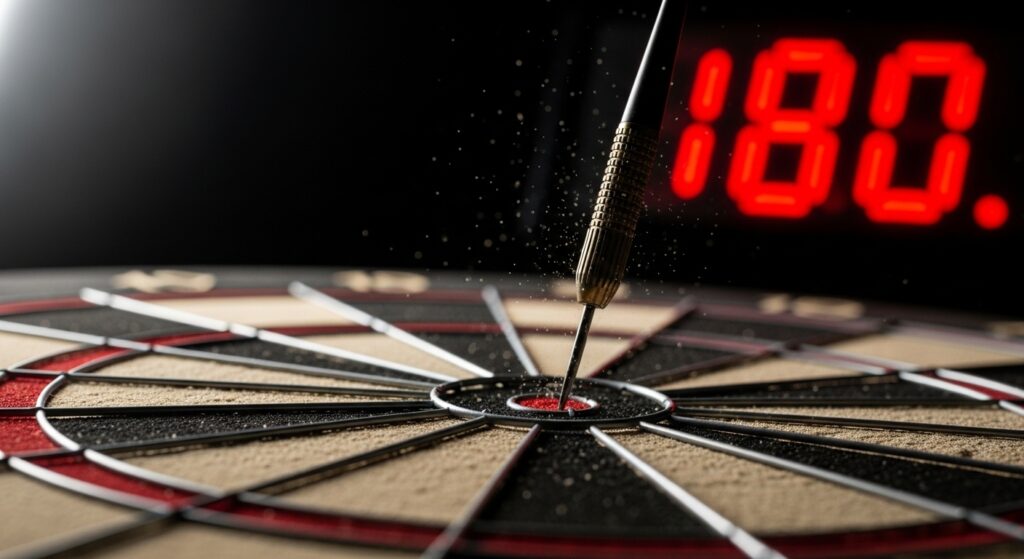
Professional Darts Rules & Tournament Scoring
When you step up to pro level (like PDC darts rules or World Darts Federation rules), it’s all about precision.
- Matches are monitored by referees.
- Players must record their own scores on visible sheets.
- Equipments get inspected before the match.
- Players have a (3 minute warm up) period.
Tournament darts scoring stays identical, just stricter on protocol. No touching darts before official confirmation, and no practice throws mid-match. For a deeper look into match strategies and scoring details, check out our match analysis section.
Dartboard Measurements Recap
| Parameter | Measurement | Regulation Body |
| Height (Bullseye) | 5’8” | WDF & PDC |
| Throw Line Distance | 7’9¼” | WDF & PDC |
| Board Diameter | 17¾” | Standard |
| Scoring Zones | 20 | Uniform worldwide |
Darts Rules Overview
| Category | Key Point’s |
| Game Objective | Reduce score (501/301) to zero |
| Scoring | Based on dartboard sections |
| Throw Count | 3 per turn |
| Winning Condition | Finish on a double |
| Equipment | Dartboard, darts, oche |
| Setup | Height 5’8”, Distance 7’9¼” |
FAQs (People Also Ask)
Q1: What are the rules of darts?
Official dart rules by the World Darts Federation says that the game starts at 501 points, and each player throws three darts per turn, reducing their score from zero to finishing on a double.
Q2: How to score in darts?
Scoring is depending on where is your dart is landing, if singles, doubles, triples, or bullseye. So the triple 20 is the highest scoring zone for 60 points.
Q3: What is the correct height and distance of dartboard?
From floor to bullseye is [ 5’8” (1.73m) ]. Throw line, [ 7’9¼” (2.37m)].
Q4: What is bust in darts?
When your score is below zero or hits exactly one instead of zero, the turn is void, and your score reverts to the start of that round.
Q5: What is the difference between 301 and 501 darts?
Everyone follows the same rules, but 301 score is shorter and better for casual or beginner games, while 501 score is the professional standard.

I’m Daniel Moore, and I live for the thrill of the game. Get energetic live commentary, detailed match analysis, data-backed betting predictions, and official team rankings right here.



